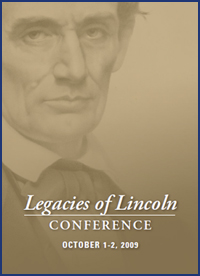Lincoln Foreword and Painting
 The just-released issue of the Marquette Law Review includes nine articles and essays growing out of (and comprising the written version of) last fall’s “Legacies of Lincoln Conference.” It was a great privilege for Professor Daniel D. Blinka and me to work with Marvin C. Bynum III, the editor-in-chief of Volume 93 of the journal, and his (our) colleagues to present this symposium. Some time ago we posted one of the papers from the symposium, the remarkable Klement Lecture delivered by Gettysburg College’s Allen C. Guelzo, which led off the conference. The Foreword of the symposium describes briefly each of the contributions and contains as well an observation on the substantive link that the Lincoln Conference provided from Sensenbrenner Hall, our historic home where the bulk of the conference occurred, to Eckstein Hall and its Aitken Reading Room, whose impressive commissioned painting, Laying the Foundation by Don Pollack, the conference helped to inspire; it also includes a reflection of sorts on broader matters. A link to the Foreword, which includes an image of Pollack’s painting, can be found here. Posts in the near future will describe and contain links to the individual articles and essays.
The just-released issue of the Marquette Law Review includes nine articles and essays growing out of (and comprising the written version of) last fall’s “Legacies of Lincoln Conference.” It was a great privilege for Professor Daniel D. Blinka and me to work with Marvin C. Bynum III, the editor-in-chief of Volume 93 of the journal, and his (our) colleagues to present this symposium. Some time ago we posted one of the papers from the symposium, the remarkable Klement Lecture delivered by Gettysburg College’s Allen C. Guelzo, which led off the conference. The Foreword of the symposium describes briefly each of the contributions and contains as well an observation on the substantive link that the Lincoln Conference provided from Sensenbrenner Hall, our historic home where the bulk of the conference occurred, to Eckstein Hall and its Aitken Reading Room, whose impressive commissioned painting, Laying the Foundation by Don Pollack, the conference helped to inspire; it also includes a reflection of sorts on broader matters. A link to the Foreword, which includes an image of Pollack’s painting, can be found here. Posts in the near future will describe and contain links to the individual articles and essays.

 The
The